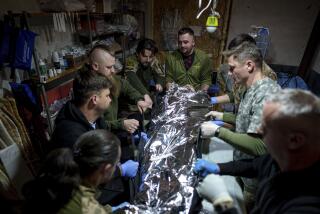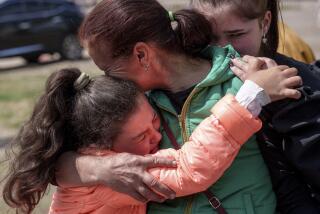Russia Suspends Assault on Chechnya’s Capital
- Share via
MOSCOW — Russia suspended its offensive against the besieged capital of Chechnya on Friday, unexpectedly announcing a halt in air and artillery strikes as well as a mysterious switch in the Russian military command in the separatist republic.
Lt. Gen. Gennady Troshev, who had been serving as commander of Russian forces in eastern Chechnya, said the Russian military decided to call a pause in the battle for the capital, Grozny, for two reasons: to protect civilian lives and to avert the possible use of chemical weapons by the rebels.
He didn’t say how long the suspension would last but insisted that the military wasn’t pulling back and would keep up pressure on the Chechen fighters. “Calling a halt does not mean a complete cessation of all military action,” he said in TV footage from the regional command center. “Combat activities will continue day and night.”
At the same time he announced the bombing halt, Troshev told reports that he and another top commander--Maj. Gen. Vladimir Shamanov, commander of the western front--had been relieved of their commands, which had been turned over to deputies. He was coy about the reasons, suggesting that the move was a routine rotation.
Valentin Astafyev, chief of the military press center in the region, said the two generals were still in their jobs but had handed over daily command decisions to their deputies so they could gain more combat experience.
No official explanations for either the bombing halt or the change in command were offered in Moscow; Friday was Orthodox Christmas, a national holiday, and government offices, including the Defense Ministry and the official press center, were closed.
Federal forces have been pounding Grozny for months with air and long-range artillery attacks designed to minimize Russian casualties. They intensified the assault last month; despite upbeat TV reports, however, there has been little indication of progress.
Western governments and human rights groups have harshly criticized the Russians over the war, which is believed to have killed a large number of civilians. But it wasn’t clear Friday whether Moscow’s decision to suspend the offensive was influenced by the Western criticism.
Unofficial reports from the region have suggested that Russian forces are making less headway on the battlefield than they claim and are encountering heavy resistance. Most of the republic is now in Russian hands, but the rebels retain control of their two strongholds: central Grozny and the Republic’s southern mountains.
“It looks very much as if the war has finally reached the breaking point and the initiative is slipping from the hands of the worn-out Russian military into the hands of the Chechen rebels,” said Pavel Felgenhauer, a military analyst for the Sevodnya newspaper in Moscow. “Federal troops have captured most of the towns and villages in Chechnya. They have spread their communication lines beyond all limits. They have exhausted all their combat ready reserves.
“Now they are at a standstill. They can’t move any further.”
Troshev insisted that the only reason for halting the bombardment was concern for civilians. He said soldiers were passing out leaflets aimed at encouraging those who remain in the shattered city to flee.
He accused the rebels of forcing some civilians to remain in the city as “human shields” and said the fighters have tried twice in recent weeks to detonate bombs laced with toxic chemicals.
“Perhaps [these reports] are exaggerated,” he said, “but all the same, Grozny is an ecological danger zone, for civilians most of all.”
Troshev’s vague explanation for the change in command in Chechnya didn’t sit well with political analyst Viktor A. Kremenyuk, who noted that the two are prominent generals who have been among acting President Vladimir V. Putin’s most ardent supporters. Kremenyuk, director of Moscow’s USA-Canada Institute, speculated that Putin might be planning to bring them to Moscow.
“Something fishy is going on down there. It is strange that the two most popular and best-known generals should be replaced like this,” Kremenyuk said. But Roman Popkovich, head of the Defense Committee in the Duma, the lower house of parliament, said he “saw nothing sinister here.”
“The command has the right to change its leadership even without reasons,” he said in an interview on Echo of Moscow radio.
The war began after two rebel incursions into Russian territory and a series of apartment bombings that the government blamed on Chechen militants. Putin has been closely tied to the conduct of the war, and Russia’s apparent successes have been chalked up to his leadership.
Political analysts have said that Putin, who became acting president when Boris N. Yeltsin resigned New Year’s eve, needs the war to continue with steady successes and minimal casualties to ensure him an easy win in the presidential election March 26.
But Dmitry V. Trenin, a military analyst with the Carnegie Moscow Center think tank, said he doesn’t believe the army can keep the war going that long without risking public disapproval. For one thing, he said, the Russian death toll is far higher than many Russians suspect, averaging about 10 soldiers a day--a rate higher than in either the first Chechen war in 1994-96, which Moscow lost, or the Afghanistan conflict.
“While people initially liked the way Putin has been conducting the war, they will appreciate him even more if he reaches a political solution” to the conflict, Trenin said. “He knows what constraints he’s operating in. He cannot continue the war indefinitely. He has an election to win, and he can only win as a man of peace.”
More to Read
Sign up for Essential California
The most important California stories and recommendations in your inbox every morning.
You may occasionally receive promotional content from the Los Angeles Times.













